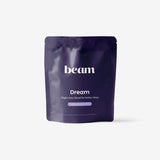While we’ve all experienced some of the immediate consequences of tossing and turning (grumpy mood + daytime sleepiness, we’re looking at you), some of the longer-term side effects of chronic bad sleep are less well-known. Below, we dive into some of the issues associated with poor sleep - and how you can finally start racking up those hours.
Sleep is the wellness world’s best-kept secret. It’s something that touches nearly every aspect of health and wellbeing, with far-reaching benefits for the way you look and feel. Which means: investing time and energy into getting your sleep schedule in good shape is like a secret shortcut to all the elements of wellness we’re already trying to improve. Read on for our ode to great sleep.
Mood
We all know what a good mood can do to our day: our interactions with others are better, our productivity skyrockets - even colors seem brighter. Poor sleep has been shown to contribute to a depressed mood, and while things like natural mood-boosting supplements, a support system, and getting outside can greatly help, they won’t make as much of a difference if you’re not also getting proper sleep.
Skin
Doing a 10-step skincare routine and still feeling like your skin is dull, lifeless, or prone to breakouts? News flash: sleep affects your cortisol levels. Higher levels of cortisol can lead to inflammation which, you guessed it, can lead to skin issues. Poor sleep can also affect collagen, which contributes to skin elasticity. Our suggestion: skip the $200 serums and opt for better sleep instead.
Hunger
We’ve said it before, and we’ll say it again: if you’re overly hungry during the day, check your hours. According to sleep scientist and Beam partner Dr. Carleara Weiss, “One night of sleep deprivation (less than 7 hours) increases the level of ghrelin, an appetite-stimulating hormone, and decreases leptin, a satiety-inducing hormone.” This means you may be prone to eating more if you’re not sleeping well, which can lead to weight gain and other health issues.
Memory
It’s no surprise to anyone that poor sleep can cause poor memory and concentration the day after, but it can create long-term memory issues as well. According to Dr. Weiss:
“Short sleep duration has also been linked to a higher risk of developing dementia. Our brain has a ‘cleaning system’ (the glymphatic system) that prevents the accumulation of molecules. This system operates during sleep. Conditions such as insomnia, short sleep duration, or other sleep disorders that reduce the number of hours of sleep have a negative effect on the glymphatic system. The accumulation of molecules such as beta-amyloid is linked to dementia and Alzheimer’s disease.”
Immune Function
Good sleep is often necessary to support the immune system. Dr. Weiss says, “Sleeping less than 6 to 7 hours per night is linked to reduced white blood cell count. White blood cells protect our body against illness and diseases, fighting viruses, bacteria, and other intruders that try to harm our bodies.” Yes, take the supplements, the cayenne ginger shots, and the Vitamin C - but also don’t forget to sleep.
Our Favorite Sleep Tips
We think of sleep as the cornerstone of wellness, with effects more potent than any product on the market. Here are our top tips for better sleep:
Ingredients like Melatonin and Hemp have been shown to improve sleep. We recommend choosing natural sleeping aids with 6mg or less of Melatonin - and no chemicals.
According to Dr. Weiss:
“The most potent stimulus for the central biological clock is light in the environment. Therefore, the biological clock shuts down the production of melatonin in the presence of light. In contrast, it stimulates the production of melatonin in the absence of light.”
Translation? Lower the lights to help you drift off - and make sure not to expose yourself to blue light right before bed.
A calming night-time routine signals to your mind and body that it’s time to wind down. Journal in bed, do some calming breathing exercises, or try diffusing some lavender essential oil to get the bedtime process started.
Kick-start your wind-down with Dream Powder, our delicious hemp hot cocoa for bedtime and one of our favorite products in our sleep remedy line.
by Samantha Colicchio
Get better sleep with Dream Powder:










